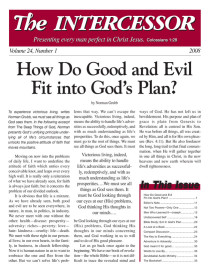
Editor’s Note
If the Total Truth, as Norman called it, is what he says it is–total–then we can expect to find answers to the most pressing issues in life. The selections in this issue of The Intercessor explore God’s total answer to the great paradox of human history: If God is good and all-powerful, why does He permit evil?
The lead article, "How Do Good and Evil Fit into God’s Plan?" is taken from Norman’s The Deep Things of God, and may be one of the most challenging excerpts ever presented in The Intercessor. Here Norman explores the "dialectic principle" underlying all life–how God works through opposites to bring about the revelation of His perfect sufficiency. Readers are encouraged to wade unreservedly and expectantly into these deep waters.
In "Evil in God’s Plan," Brett Burrowes’ Bible study takes head-on the apparent paradox of the existence of evil under the reign a good God. Written to address the 9-11 tragedy, this brief but excellent study underscores how God uses Satan–and Satan-operated men–to accomplish His sovereign purposes. "Ultimately," Brett writes, "Our safety is in God’s hands, as are all the events of our lives."
But having daily experienced the goodness and faithfulness of God, why do we still judge by outward appearances and question God’s wisdom and provision? In "Undiscovered Self," Norman shows how "God’s Spirit has to take every forward-moving soul through a drastic process of self-exposure" to expose the hidden root of sin. Using the lives of Abraham, Jacob, and Joseph, Norman illustrates how God exposed the independent self-principle with its "presumptuous claim to be a sufficient source of wisdom and ability."
"Men Who Learned it–Joseph" is a close-up of the life of a godly youth who faced blow after blow of injustice. For what purpose? For God to mature him in faith to emerge the savior of a nation and an example to all believers. Another excellent look at the Spirit’s work in Joseph’s life is Norman Grubb’s CD "Joseph–Great Dreamer, Nation Saver," reviewed in this issue by Chris Anderson.
Applying faith to every situation of life requires moving from outward negative appearances and our reaction to them to seeing as God does. In "The Key to Everything" Norman reveals how Jesus lived totally from God’s perspective, paying no attention to the laws of chemistry–turning water into wine, or physics as He walked on water and multiplied the loaves and fishes. For Jesus–and for us today–"The real One is right in the situation–not afar off, but the very situation is He in disguise–He with supply, solution, change, where we only see the opposite."
Similarly, in "Not Two Powers–Only One" Norman affirms God’s autonomy over all our circumstances and over Satan ("God’s convenient agent"), working out His perfect and loving will. Driven by his personal search for a "total God," Norman shares with us the "solid ground" for accepting trials with total joy, understanding them as the "negative background for His great design of perfect love."
Finally, it is fitting that the feature articles in this issue are taken from every one of Norman’s most well-known books dealing with the Total Truth. And we are pleased to offer our readers for the first time all six re-published Norman Grubb books in hardback editions–while stocks last.





